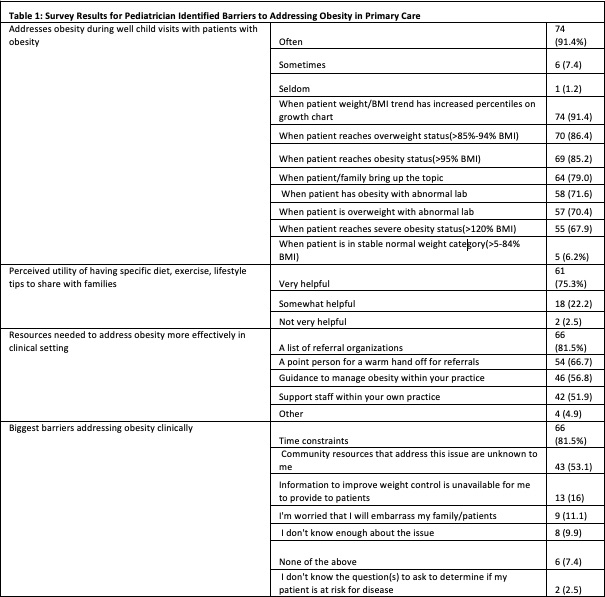Back
Background: Obesity is a chronic, multifactorial disease affecting 1 in 5 youth. The AAP 2007 Expert Committee Guidelines recommend initiating BMI-based obesity screening at age 2, screening for common obesity related co-morbidities, and frequent visits to support weight management. The pediatrician's role and responsibility in weight management is clear, but many clinicians describe lacking skills, knowledge, and time to tackle the multifactorial issue.
Objective: This project aims to assess the barriers to care identified by general pediatricians in order to develop effective tools that streamline clinical recommendations, strengthening clinical-community partnerships to better address obesity and its comorbidities.
Design/Methods: A mixed methods study was conducted by distributing a survey to 380 pediatric providers in the greater Washington, D.C. area through a large pediatric health network listserv. Within an identified subgroup of primary care providers, 3 focus groups were conducted to further explore findings from cross sectional analysis. A comprehensive literature review was completed to ensure up to date evidence-based recommendations for diagnosis and management of childhood obesity and its complications. Pediatric sub-specialists across Children’s National Hospital participated in an iterative process to develop a comprehensive clinical algorithm.
Results: 81 pediatric providers completed the survey, and each focus group contained 4-10 clinicians. 6 primary themes emerged regarding clinical barriers to addressing obesity in the primary care setting: 1) limited time, 2) clinician perceived familial resistance, 3) challenges with cultural competency, 4) perceived environmental barriers, 5) limited knowledge of community resources, and 6) inadequate collaborative support. Based on these results, an institutional algorithm with 9 pediatric pathways was developed to streamline effective care. In addition, 7 patient education handouts and a patient navigator network were created to assist families in connecting to local community resources.
Conclusion(s): Pediatric providers continue to endorse significant challenges in addressing obesity in primary care. Novel and tailored evidence-based resources bridging individual institutions and communities may serve as a mechanism to improve clinician practices in future management.

Obesity
Obesity 2
398 - Addressing Obesity in Pediatric Primary Care: Development of Institutional Algorithms and Management Tools Utilizing a Multidisciplinary Approach and Community Collaborations
Friday, April 28, 2023
5:15 PM – 7:15 PM ET
Poster Number: 398
Publication Number: 398.146
Publication Number: 398.146
Chloe M. Becker, George Washington University School of Medicine and Health Sciences, Washington, DC, United States; Alicia Tucker, Children's National Health System, Alexandria, VA, United States; Aiesha Basha, The George Washington University School of Medicine and Health Sciences, Washington, DC, United States; Grace S. Liu, George Washington University School of Medicine and Health Sciences, Washington, DC, United States; Curran E. Reilly, George Washington University School of Medicine and Health Sciences, Washington, DC, United States; Kofi Essel, Children's National Health System, Washington, DC, United States
- CB
Chloe M. Becker, BS (she/her/hers)
Medical Student
George Washington University School of Medicine and Health Sciences
Washington, District of Columbia, United States
Presenting Author(s)
Background: Obesity is a chronic, multifactorial disease affecting 1 in 5 youth. The AAP 2007 Expert Committee Guidelines recommend initiating BMI-based obesity screening at age 2, screening for common obesity related co-morbidities, and frequent visits to support weight management. The pediatrician's role and responsibility in weight management is clear, but many clinicians describe lacking skills, knowledge, and time to tackle the multifactorial issue.
Objective: This project aims to assess the barriers to care identified by general pediatricians in order to develop effective tools that streamline clinical recommendations, strengthening clinical-community partnerships to better address obesity and its comorbidities.
Design/Methods: A mixed methods study was conducted by distributing a survey to 380 pediatric providers in the greater Washington, D.C. area through a large pediatric health network listserv. Within an identified subgroup of primary care providers, 3 focus groups were conducted to further explore findings from cross sectional analysis. A comprehensive literature review was completed to ensure up to date evidence-based recommendations for diagnosis and management of childhood obesity and its complications. Pediatric sub-specialists across Children’s National Hospital participated in an iterative process to develop a comprehensive clinical algorithm.
Results: 81 pediatric providers completed the survey, and each focus group contained 4-10 clinicians. 6 primary themes emerged regarding clinical barriers to addressing obesity in the primary care setting: 1) limited time, 2) clinician perceived familial resistance, 3) challenges with cultural competency, 4) perceived environmental barriers, 5) limited knowledge of community resources, and 6) inadequate collaborative support. Based on these results, an institutional algorithm with 9 pediatric pathways was developed to streamline effective care. In addition, 7 patient education handouts and a patient navigator network were created to assist families in connecting to local community resources.
Conclusion(s): Pediatric providers continue to endorse significant challenges in addressing obesity in primary care. Novel and tailored evidence-based resources bridging individual institutions and communities may serve as a mechanism to improve clinician practices in future management.

